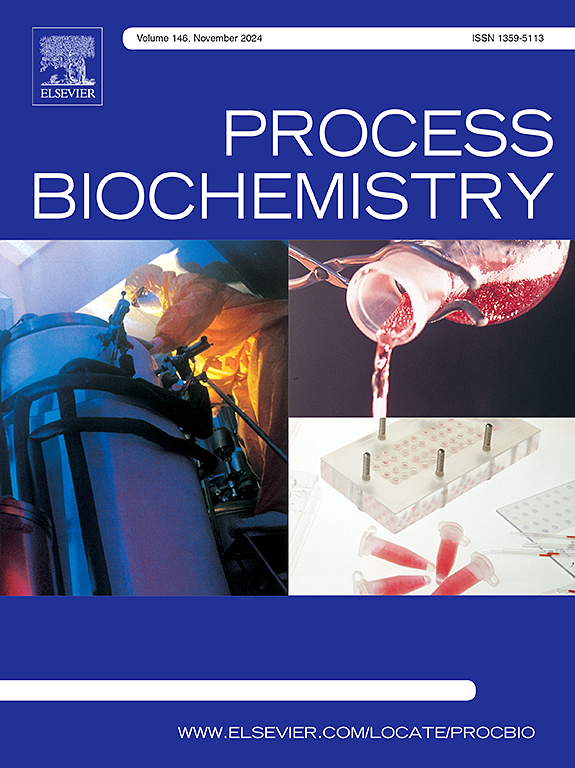Use of Rhizomucor miehei fermented babassu cake (an agro-product residue) as efficient biocatalyst for macaúba acid oil deacidification in solvent-free medium: Transforming a non-edible crop product in a favourable biodiesel feedstock
IF 3.7
3区 生物学
Q2 BIOCHEMISTRY & MOLECULAR BIOLOGY
引用次数: 0
Abstract
Macaúba, a native South American palm, is used to recover degraded areas in important Brazilian biomes and presents a high oil productivity. Macaúba pulp oil is a sustainable alternative for biodiesel production. However, its high acidity represents a problem for its use. This paper shows an enzymatic process to reduce the acidity of macaúba pulp oil (9.5 wt% acidity) using a low-cost agro-industrial by-product to get a solid-state fermented solid with lipase activity from Rhizomucor miehei. Ethanol, methanol and glycerol were evaluated as acyl acceptors for the esterification of the free fatty acids (FFA) in the oil. Methanol was the best acyl acceptor, with 3.6 and 2.4 times higher deacidification rate than ethanol and glycerol, respectively, for reactions conducted with FFA to alcohol stoichiometric molar ratio. The alcohol stepwise addition strategy gave better results for all tested acyl acceptors. At the best reaction condition (methanol/FFA molar ratio of 6:1, methanol stepwise addition), the desired FFA esterification (acidity of 0.4 wt%, compatible with biodiesel plants requirements) was attained after only 2.5 h. This means the conversion of two no interesting crop products into valuable products.
在无溶剂介质中使用 Rhizomucor miehei 发酵的巴巴苏饼(一种农业产品残渣)作为高效生物催化剂进行玛咖巴酸油脱酸:将非食用作物产品转化为有利的生物柴油原料
马考巴是南美洲的一种原生棕榈树,可用于恢复巴西重要生物群落中的退化地区,具有很高的榨油率。马考巴果肉油是生物柴油生产的可持续替代品。然而,它的高酸度给其使用带来了问题。本文展示了一种利用低成本农用工业副产品降低玛咖巴纸浆油酸度(9.5 wt% 酸度)的酶解工艺,从 Rhizomucor miehei 中获得一种具有脂肪酶活性的固态发酵固体。乙醇、甲醇和甘油被评估为酯化油中游离脂肪酸(FFA)的酰基受体。甲醇是最佳的酰基接受体,在以 FFA 与酒精的化学摩尔比进行的反应中,甲醇的脱酸率分别是乙醇和甘油的 3.6 倍和 2.4 倍。对于所有测试的酰基受体,醇逐步添加策略都能取得更好的结果。在最佳反应条件下(甲醇/FFA 摩尔比为 6:1,甲醇分步添加),只需 2.5 小时就能达到理想的 FFA 酯化效果(酸度为 0.4 wt%,符合生物柴油工厂的要求)。这意味着两种无意义的农作物产品转化成了有价值的产品。
本文章由计算机程序翻译,如有差异,请以英文原文为准。
求助全文
约1分钟内获得全文
求助全文
来源期刊

Process Biochemistry
生物-工程:化工
CiteScore
8.30
自引率
4.50%
发文量
374
审稿时长
53 days
期刊介绍:
Process Biochemistry is an application-orientated research journal devoted to reporting advances with originality and novelty, in the science and technology of the processes involving bioactive molecules and living organisms. These processes concern the production of useful metabolites or materials, or the removal of toxic compounds using tools and methods of current biology and engineering. Its main areas of interest include novel bioprocesses and enabling technologies (such as nanobiotechnology, tissue engineering, directed evolution, metabolic engineering, systems biology, and synthetic biology) applicable in food (nutraceutical), healthcare (medical, pharmaceutical, cosmetic), energy (biofuels), environmental, and biorefinery industries and their underlying biological and engineering principles.
 求助内容:
求助内容: 应助结果提醒方式:
应助结果提醒方式:


